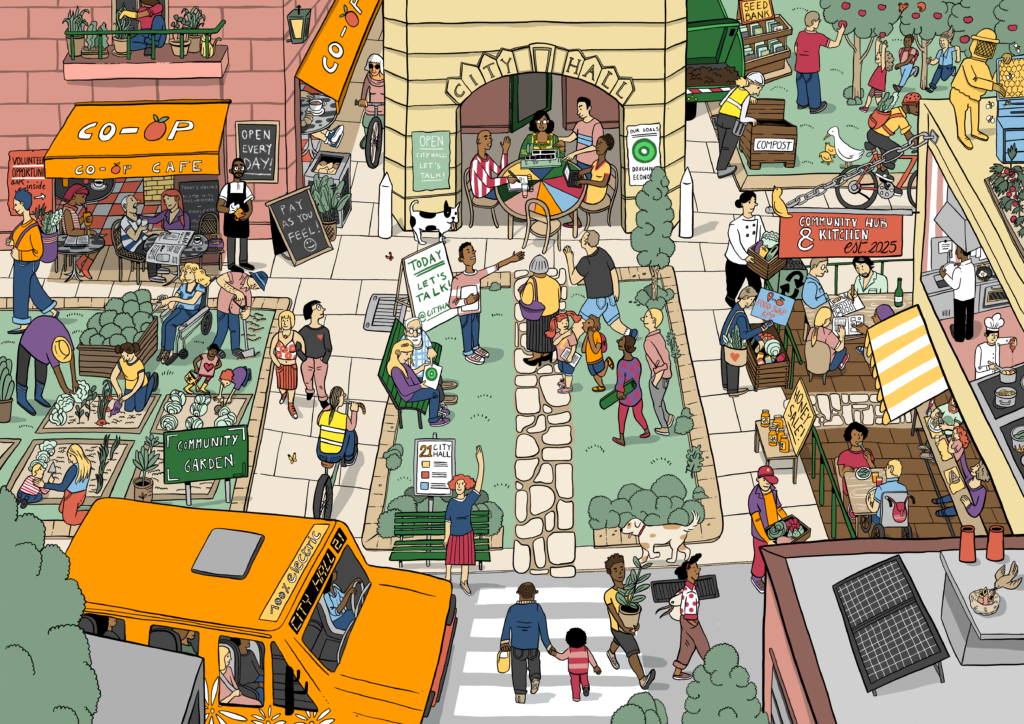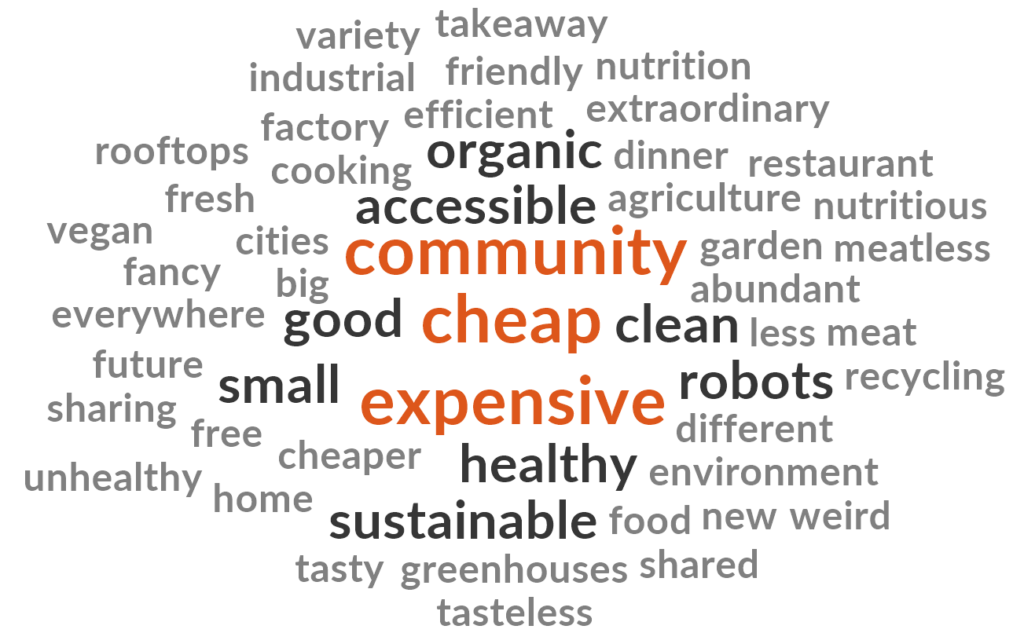Food Sharing Futures: SHARECITY Flash Fiction Competition
Published by SHARECITY on the 13th July 2021.

Image: Desirable Future Scenario © RIVA Illustrations – Fiammetta Ghedini
As part of our work examining the future of food sharing governance, SHARECITY held two workshops and a flash fiction writing competition with transition year students (aged 15-16) at a local school. SHARECITY has been working with illustrator Fiammetta Ghedini of RIVA Illustrations to create visualisations of three different future scenarios for urban food sharing: Desirable, Business as usual and Technical fix, that were formulated using a three horizons approach and data from empirical work internationally and the sharing futures workshop held in 2019.
We were keen to engage with young people to evaluate the effect of visualising futures in this way; to explore whether it helps facilitate dialogue on issues of sustainability and justice within urban food systems, and the solutions and opportunities already existing, such as food sharing.
Above is the image of the Desirable Future, showing a more inclusive and sustainable urban food system as could exist in 2050, with a meaningful role for food sharing initiatives. Take a moment to look at the community gardens, seed sharing activities, community kitchen, co-op and many more details contained in the image above!
The first workshop introduced students to key issues of sustainability and justice in urban food systems to set the context of engagement on these issues. The concept of food sharing was also discussed, with findings of the SHARECITY project about the solutions food sharing offers to existing environmental and social issues in cites discussed. During this workshop, students were presented the Desirable Future scenario image and invited to submit a story in response to the question: What does a typical day in your life look like in this city?
We were really impressed by the submissions we received to the competition. The responses were creative, including a poem, and all shared wonderful imaginative insights to what the future could hold. Such ideas included future students learning about “worms and their importance to society” and one entry which interestingly explored the importance of trust for cultivating food sharing futures.
Students were asked to fill out a short pre- and post-workshop survey. This enabled us to get feedback from the students on the workshop experience and measure the potential impact of these sorts of methods of engagement with young people, as well as the level of engagement of students with such issues before the workshop. Some of the findings were quite interesting and challenge current perceptions of young people’s engagement on important social and environmental issues.
The climate strikes of recent years have disrupted traditional stereotypes of apathetic youth, and the findings of the surveys with students further highlight their engagement with, and forward thinking, on current issues. Showing an understanding of the importance of localised food systems, 86% of students believed it was better for the environment to eat local fruit and vegetables grown in season. An overwhelming 93% of students believed that food is a human right, contrasting hugely with the dominant commodified food system.
Participation in the workshops and seeing the visualisation of the desirable future scenario seems to have enhanced students’ awareness and appreciation of the role food sharing could play in the future. After participating in the initial workshop, when asked “What are three words that come to mind when you think about the FUTURE of food in cities?”, students shared the following responses:

Word cloud generated using NVivo
Interestingly, there were differing perceptions as to what future food would cost (expensive vs. cheap), but even more interesting is for the first time words such as “community”, “shared”, “abundant” and “rooftops” came to mind for students when thinking about the future. For us, this is a heartening finding, showing that engagement with the visual image had an effect on students’ perception of the future and the role of sharing, community and the abundance possible within urban food futures. Of course, such a future being realised depends on food sharing being valued within urban policy and planning. With a 16 year old today set to be 45 years old in 2050, the futures we are talking about really are their futures. Creating spaces for engagement with young people and including them in a meaningful way on these issues which will so fundamentally shape their own futures will hopefully be pursued further within policy making.
In their overall feedback, students shared an interest in getting involved more practically in food sharing, in particular in growing and cooking food. For schools interested in engaging students on issues of sustainability, a community school garden may be a fruitful avenue. Students expressed the desire to learn how to grow their own food sustainably, to grow and cook food in their community with others, indicating that providing wider channels for engagement and participation of young people in such activities would be worthwhile.
Furthermore, students also shared a desire to be more meaningfully included in such engagement processes. For us, the learning is to develop longer-term engagements with students beyond two workshops. On the basis of this pilot, we are exploring the possibility of developing a longer course with transition year students to interact on issues of sustainability, justice and food sharing futures.
——
Louise Fitzgerald
© 2015 - 2025 ShareCity | Web Design Agency Webbiz.ie







